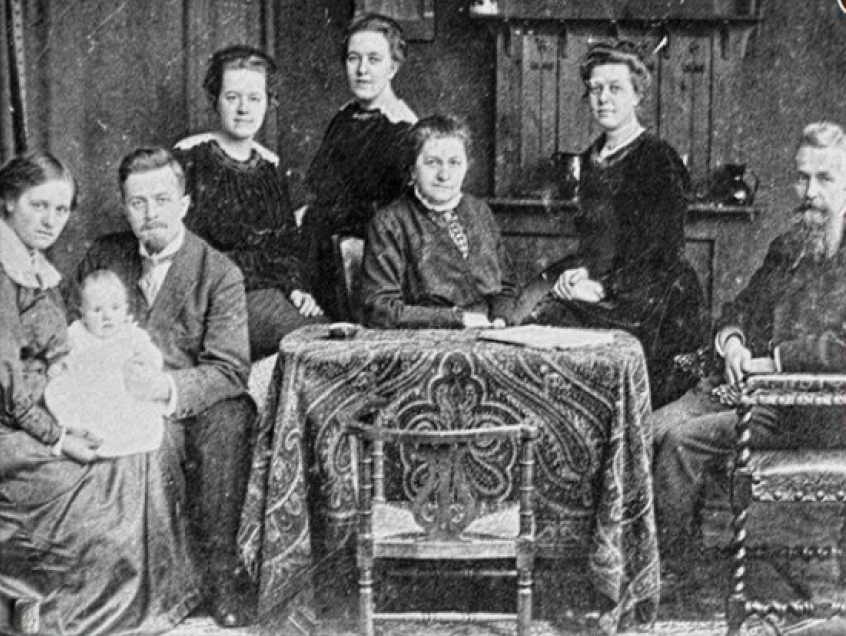
Born on Good Friday, April 15, 1892, Cornelia (Corrie) ten Boom was the fourth surviving child of Casper and Cornelia ten Boom. After her birth the family moved to Haarlem, where Casper took over the family business of repairing and making watches. Though her family was not particularly well off, Corrie grew up witnessing the hospitality of her poor but generous parents, informed by their Dutch Reformed faith. Corrie herself confessed Christ at the young age of five.
Their architecturally meandering home, containing the watch shop and two adjacent buildings, was affectionately nicknamed the Beje and was often overflowing with the extended ten Boom family, the bustling watch shop, and a stream of visitors. After 1918 the ten Booms also housed displaced German families and fostered the children of missionaries; this practice of hospitality continued even after the deaths of Corrie's aunts and mother.
These missionary children were especially dear to Corrie; she called them her 'Red Cap Club'. Her Bible training in her late teens and her love of children would later lead her to found Christian girls' clubs in Haarlem that only disbanded due to the German occupation of the 1940s.
Like her elder sister Betsie, Corrie never married, but the two sisters worked diligently in the family home and business. Unlike her father, Corrie was business-minded, and her pragmatic management of the watch shop actually made a profit where Casper's good intentions had not. Her gift in the trade led to an apprenticeship, and in 1924 she became Holland's first licensed female watchmaker. Another decade would pass before her contented, quiet life would abruptly change.
As Hitler rose to power, anti-Semitism wormed into German consciousness once again, rapidly laying the groundwork for a public campaign against Jews. Vicious attacks and forced business closures and seizures were a daily reality.
The news traveled quickly to neighbouring Netherlands, the atmosphere there likewise changing though the rumbling was still distant. Corrie's brother Willem, a concerned pastor working with Jews in Germany, brought the news of Jewish persecution home to Haarlem. Corrie later wrote:
'We knew what was happening—there was no way to keep from knowing. . . . .when Willem was visiting and would not let us forget, or when letters to Jewish suppliers in Germany came back marked "Address Unknown," we still managed to believe that it was primarily a German problem. "How long are they going to stand for it?" we said. "They won't put up with that man for long".'
But put up with it they did. Humiliated and economically devastated after World War I, Germans whole-heartedly embraced Hitler's rhetoric. The gears of war were already grinding.
Germany invaded Poland in 1939, declaring war also on France and the United Kingdom. Neutral in the first world war, Holland again claimed neutrality to defend its precarious safety. With confirmation from both sides that their borders would be respected, Holland's Prime Minister took to the radio on the evening of May 10<sup>th, 1940 to reassure the Dutch people. But the war for Holland began only hours later with furious airstrikes throughout the country. Awakened by the bombings, Corrie and Betsie ten Boom were praying earnestly when Corrie experienced a premonition of her own--she, her family, and friends carried on an old wagon out of Haarlem to an inescapable fate.
The German invasion of the Netherlands ended within days. Following the flight of Holland's Queen Wilhemina and the devastating bombing of Rotterdam, Dutch forces surrendered. The German occupation began.
For those like Corrie and her family, the first few months of the occupation were bearable. Meeting the criteria for ubermensch, the genetically desired qualities that Nazis felt constituted the Aryan race, the Dutch received a measure of leniency from German soldiers. Even so, the systematic control of the populace took effect immediately. Citizens were required to carry identity cards to be produced on demand to any German soldier or policeman. Ration cards replaced currency, curfews kept citizens indoors after 10 PM, and radios spewed German propaganda.
The propaganda struck a chord, however, and Nazism's insidious ideology gained traction and power with every passing month of the occupation, leading to the empowerment of Holland's National Socialist Bond. A classically fascist organization sympathetic to the German agenda, the NSB quickly absorbed and endorsed Nazi anti-Semitism and recruited members aggressively. The organization was largely successful as power and privilege came with membership; more ration cards, coupons for clothing, better jobs and the best housing.
Armed with a pro-Nazi agenda and newly granted positions of power at every civic level, the NSB effectively became the force tasked to correct Holland's own 'Jewish Problem'. Just as in Germany, terrorizing Jews now became a public campaign. Jewish-owned businesses were vandalized, synagogues burned, and those who bore the yellow star vanished daily, their vacant homes filled with NSB families eager to supplant them.
The ten Booms now faced a terrible choice: to watch passively as their Jewish neighbors were deported or risk losing their lives to save them. Corrie was 50 years old when she joined the Dutch Resistance and offered the Beje as a safe-house for Jews and resistance workers.
For two years the ten Booms housed, fed, and relocated Jews and anyone else passing through, miraculously obtaining enough ration cards and other supplies to care for them despite the watchful eyes of the SS. headquarters nearby. A secret room with a sliding panel was also built in Corrie's bedroom, providing a hiding place for the Jews and underground workers who lived in the Beje long-term.
But this success did not last. On February 28<sup>th, 1944 the Gestapo raided the Beje. Though the six people living illegally in the house survived in the hiding place, Corrie, her siblings, father, and two nephews were arrested and eventually transferred to Scheveningen prison. There, Casper ten Boom died, and Corrie and Betsie were sent first to the camp in Vught, Holland and later deported by train to Ravensbruck in Germany in September 1944.
Despite brutal conditions, abuse from guards, and the murder of prisoners around them, Betsie and Corrie ministered to the women in the camp, sharing the Gospel from a small smuggled Bible. Even as many fellow prisoners turned to Christ, Betsie fell ill and died at Ravensbruck on December 16, 1944. On Christmas Day Corrie received release orders from Ravensbruck. Later, it was discovered her release was the result of a clerical mistake—the women of her age group at the camp were executed not long after she was freed.
By the time the war ended in May, 1945, some 110,000 Dutch Jews had been deported to concentration camps, along with many members of the Dutch Resistance. Three quarters of these Jews never made it home, giving the Netherlands the second highest mortality rate among nations during the Holocaust.
In the years that followed the war, the courageous faith of the ten Boom family was not forgotten. Their actions, resistance, and ultimate sacrifices were retold and remembered through Corrie for the generations to come. As for Corrie herself, she opened a home for spiritual, emotional, and physical recovery and is well-known for offering forgiveness to the guards who held her captive. Through her books and speaking tours she touched millions of lives before dying on her 91<sup>st birthday in 1983. Even after emerging from the great darkness of WWII, she often recalled Betsie's hope-filled words: 'There is no pit so deep that God's love is not deeper still.'
Kaylena Radcliff is the circulation manager at Christian History magazine. In addition, she is a budding writer having authored the biography, titled: Torchlighters Heroes of the Faith: Corrie ten Boom, a popular title in the award-winningTorchlighters DVD series. She also writes the curricula for the Torchlighters series' study guides. Kaylena and husband, Tim, are expecting their second child. Follow on Twitter @ktherad













